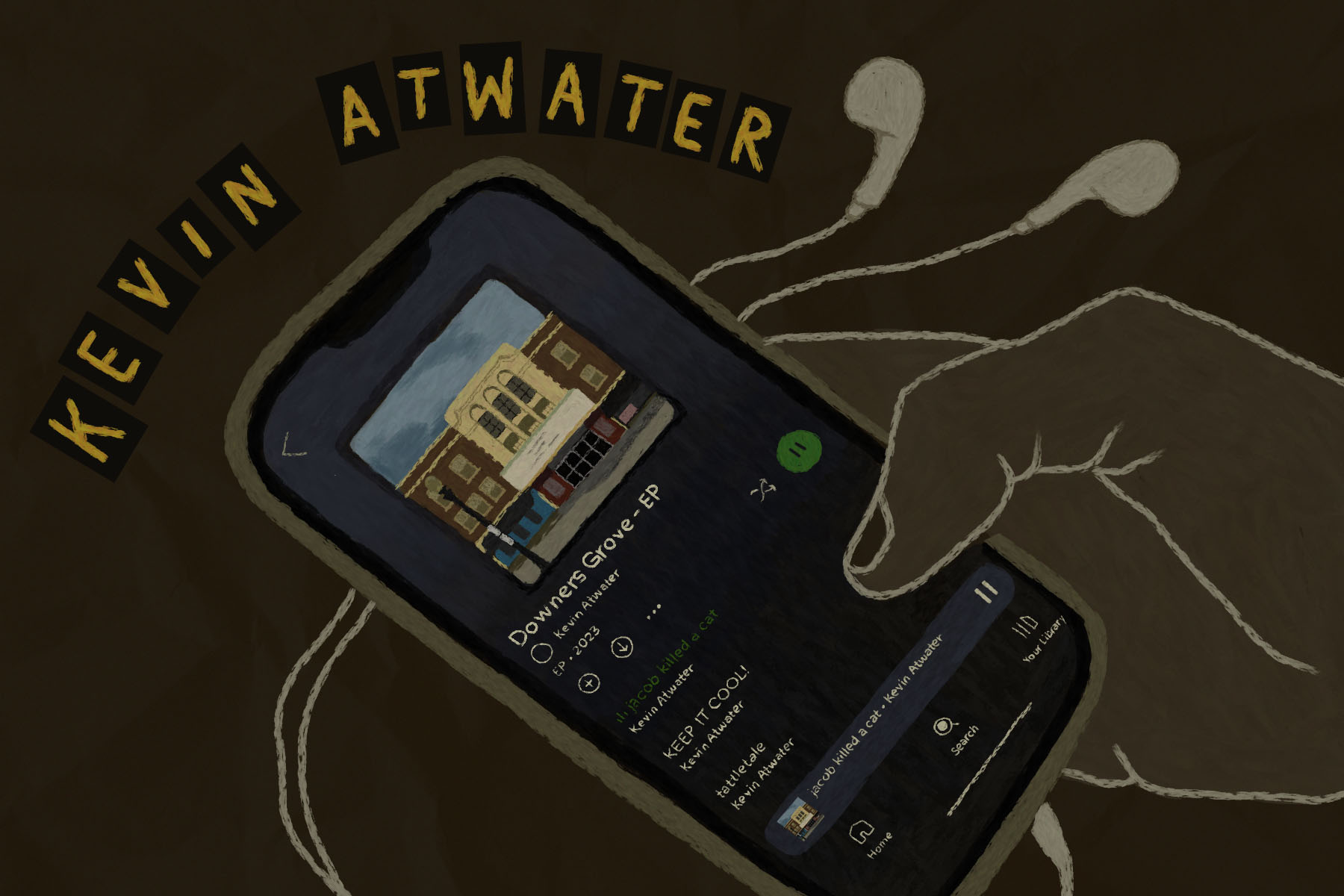In 2020, the pandemic brought with it a surge of rising stars from all walks of life. TikTok became the pathway to prominence, and many aspiring artists used it to their advantage. Singer-songwriter Kevin Atwater is one of the many creatives who has garnered attention over the past year by using social media to share his music. Although Atwater didn’t use TikTok until just over a year ago, he has been creating his own music for public consumption since August 2020.
Atwater’s debut single, “Freckles,” tells an all-too-relatable story of desire. Most of his music depicts love in its various forms through anecdotal tales. His most recent EP, “Downers Grove,” is no exception. However, this time around, Atwater offered his listeners an unusual gift. Following the EP’s initial release on April 26, 2023, Atwater dropped a deluxe edition that included corresponding tracks that explained the inspiration and creative process for each song. After the May 24 album release, Atwater unveiled yet another version of the EP. On June 21, he unearthed all six original demos for his fans to hear in their most stripped forms.
The opening track, “jacob killed a cat,” presents a shared sense of misery among young Atwater and the boys of his childhood. They all had to hide secrets about their identities, as their upbringings left them with no choice but to put on an act. Perhaps in reference to the concept of toxic masculinity, Atwater admits, “We spend all our time proving to no one we don’t cry / If no one sees it, then it never happened.” Atwater speaks to the disturbing way society raises boys to hide their negative feelings, which evidently leads to unresolved emotional issues that could result in trauma. Referring to each of the two struggling boys he mentions in the song, Atwater attests, “God I would cry with him now.”
The original demo is essentially a rough draft of the song, with only minor alterations between the two. The demo, as expected, holds the bare bones of the song’s final form. One notable difference is the addition of a quiet voice note at the beginning of the final version — a seemingly insignificant detail that actually adds some personality to the tune. The voice starts the song with, “I wanna remember this.” The concise statement imbues the song with greater meaning given that Atwater sings about outward disapproval and stifled emotions in childhood. He also includes a stream of vocals to end the song that weren’t a part of the original demo. While these sounds may seem like nothing more than a series of “oohs” and “ahs,” they evoke emotion from listeners. The ending vocals contribute to a larger sense of ache from Atwater’s untended wounds.
In all its beauty, this track might provoke listeners to consider the pains of their own childhoods. In his voice note explanation of the song, Atwater recalls a time in middle school when “[He] wasn’t able to say the things [he] wanted to say.” Unspoken, he swallowed his words and chose to move on. That is, until this song came out. Regarding the two boys mentioned in the song, as well as himself, Atwater came to the conclusion that they “all denied [themselves] the chance of true emotional honesty and connection in favor of silence.” The opening track mourns what could have been had one of them spoken up.
Atwater reminisces on another relationship bound by higher approval in “star tripping.” This time romantic, Atwater’s relationship is stunted by his boyfriend’s fear of damnation from God. Atwater realizes, “I’m falling for a boy who thinks that falling’s a sin.” The boy’s religious upbringing faults him for his romantic attraction to another boy, which prompts him to lash out at Atwater. The boy’s guilt plagues both of them. Speaking to this boy, Atwater reflects, “You think He made you wrong / I think you give Him way too much credit.” Ultimately, the boy’s supposed transgression against God ends their relationship. Atwater couldn’t bring himself to fall for someone who thinks their relationship is immoral.
The original demo does not include the last four lines and accompanying music that appear on the EP track. Listeners can only wonder whether or not Atwater added this last verse toward the end of the song’s production. Despite its brevity, the verse contributes significantly to the story. In the last four lines, Atwater concedes, “I’m tapping out,” eventually asserting, “I’m not falling for a boy who thinks that falling’s a sin.” These lines change the event entirely. They represent the difference between Atwater waiting around for change and choosing to find someone who is proud to be with him. In the end, the verse reveals that Atwater has more agency in love than he thought.
After expounding what star tripping actually is, Atwater divulges its deeper meaning: “It became sort of a metaphor for the whole song — the danger, the high, the stupidity of it all — and then, it’s over.” The rush Atwater describes is familiar: invigorating, alluring and, ultimately, fruitless all at once.
Atwater affirms that there is no bad blood, though. He admits, “It ends with me eventually leaving the relationship on a hopeful note, looking for a love that I deserve.” Atwater’s confession that he thinks about the subject of the song a lot demonstrates that his retrospection on the situation is now much more informed. Most importantly, he knows what kind of love he needs and feels optimistic about his endeavor to find it.
Throughout all renditions of the EP, Atwater’s voice is silky smooth and calming. Of course, the finalized versions of each song boast louder and clearer vocals. As a result, the guitar notes that took prominence in the original demos appear softer in the final EP.
There are four more songs to explore on these three releases, all of which are delightful in their own right. Atwater may like a sad song, but he definitely knows how to do it properly. The EPs, along with their elaborations, narrate stories of Atwater’s youth that combine sexuality with religion, heartbreak with hope. Given its shorter nature, “Downers Grove” deserves at least one listen all the way through. If it’s your kind of style, there are two other iterations to enjoy while you wait for more.
















